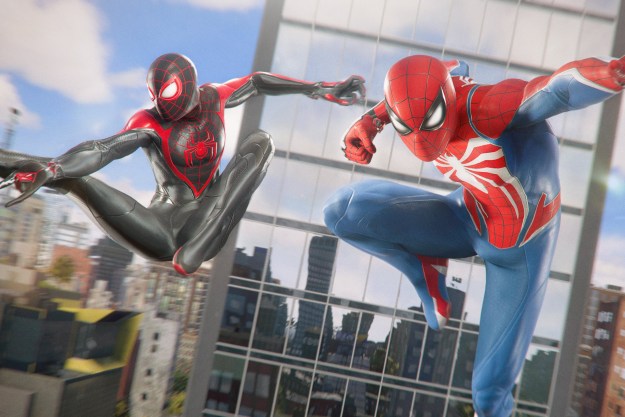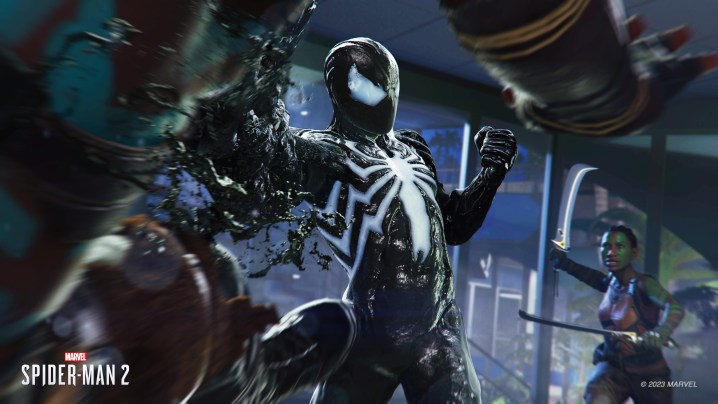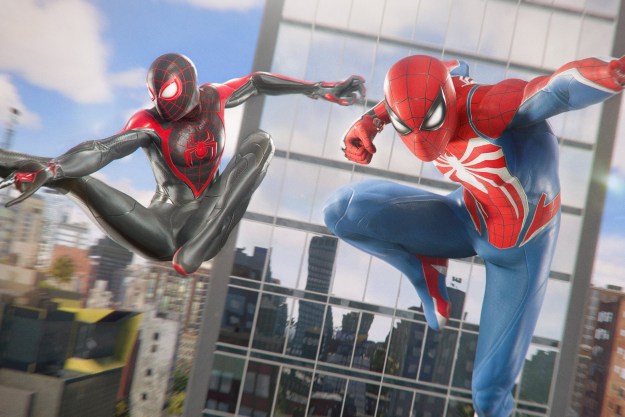
“Marvel’s Spider-Man 2 swings above its predecessors in a bigger, fiercer sequel that gets the most out of the PS5’s power.”
- Nuanced story
- Standout sidequests
- Excellent combat
- Traversal is even better
- PS5’s most powerful game
- Plot can feel bloated
Marvel’s Spider-Man 2 really makes you feel like Spider-Man. In terms of being very stressed-out, that is.
I mean, really put yourself in Peter Parker or Miles Morales’ spandex for a moment. Sure, you’d get to turn New York City into your own personal jungle gym, but consider everything else you’d be juggling. For Peter, it means holding down a stable day job, paying the bills on a house you’ve inherited through tragedy, maintaining your relationship with Mary Jane Watson, and being there for a sick (and parasite-infested) friend. And if you’re Miles, you’re scrambling to help your community while keeping your grades up and dealing with the lasting trauma of losing your father. That’s not to mention that, in both cases, you’re also dealing with a gang of bloodthirsty hunters out to kill you. Still want to put on that super suit?
It’s a raw tension that developer Insomniac doesn’t shy away from in the spectacular Marvel’s Spider-Man 2. Though it delivers some of the most astonishing action to ever grace a video game, the superhero sequel almost also serves as a deconstruction of its own power fantasy. No matter how strong a hero is, there are some problems that can’t be punched away.
Marvel’s Spider-Man 2 delivers a personal story about two busybodies struggling to find balance in their lives, while all webbed up in larger-than-life comic book arcs. That’s a perfect match for Insomniac’s winning action-adventure formula, which is improved in almost every conceivable way here. Its expansive narrative and open-world checklists may feel overwhelming at times, but that effectively drives home its ultimate point: Great power isn’t a cure for great responsibility.
Video review
Weight of the world
Marvel’s Spider-Man 2 serves as a sequel to both the series’ first entry and its Miles Morales-focused spinoff. Now working together as a spider dream team, Parker and Morales watch over not just Manhattan, but a (geographically truncated) slice of Brooklyn and Queens too. You’d think that would make both of their jobs easier, but they become more overwhelmed than ever with the arrival of the ruthless Kraven the Hunter, who is rounding up villains around town. It’s a simple enough comic book story that soon mutates further when a parasitic hunk of black goo takes a liking to Peter.
At times, that sprawling story can feel bloated, especially coming off of Morales’ lean solo adventure. Miles and Peter (who players can instantly switch between at just about any time) don’t just come with their own character arcs, but the casts of their respective games too. Each story mission stacks more characters and villains into a sweeping story that wobbles like a Jenga tower early on. It feels like it’s in danger of repeating the flaws of Sam Raimi’s Spider-Man 3 at times — and not just because of a certain long-tongued menace.

Though that may sound like a typical case of sequel syndrome (and it perhaps is to an extent), it’s also an ingenious way to reflect its heroes’ mental space. Both Spider-Men are struggling to hold an entire city up on their shoulders; their responsibilities pull them in every direction like a Symbiote’s tendrils. As a player, I felt that too. Anytime I’d try to focus on the main story, I’d find myself sidetracked by a huge map full of side activities, all with their own engrossing stories to tell. It’s the best possible narrative to pair with the kind of open-world structure that tempts players with constant distractions; I truly become Spider-Man, burdens and all.
The narrative works best when I approach it less as a single comic arc and more as multiple interweaving runs leading up to one venomous crossover event. Miles’ missions particularly shine, telling a more personal story about a kid trying to do right by his community, though it’s the side missions that stay with me more than anything. One-shot stories, like one where Peter simply listens to an old man reflect on his life or another where Miles helps rebuild a museum paying tribute to Black music history, remind me why these characters are still so willing to break their backs to save their city. Every person is worth protecting.
Marvel’s Spider-Man 2 really is the ultimate superhero game.
Those personal stories help fill out some of the sequel’s more typical comic book plotlines. Kraven doesn’t leave much of an impression as a big bad; he’s more of a catalyst that can fill the game with new bad guys to beat up than he is a memorable villain. Peter’s Symbiote corruption doesn’t break new ground either, as a sizable chunk of the game is focused on a familiar power struggle. Both stories pay off in a big way, though, once the heavily advertised Venom eventually tears into the picture. That arrival ushers in an exhilarating, high-stakes finale that pushes each hero to their limits.
Taken as a whole, Marvel’s Spider-Man 2 really is the ultimate superhero game. That’s not because it’s filled with crowd-pleasing Easter eggs, but because it’s one of the few that dares to grapple with the nightmares of the job instead of just letting players live the dream.
Pow! Thwack!
Those narrative ambitions aren’t exclusive to cutscenes; Insomniac bakes them into some of its new gameplay tweaks. That’s most effective in the sequel’s revamped combat system. Like the previous two installments, Spider-Man takes notes from the Batman Arkham playbook to deliver fast and fluid fighting that’s as satisfying as ever. The twist is that both Spider-Men can now execute superpowered moves that operate on a cooldown (not dissimilar to how Sony exclusives like God of War Ragnarok work).
It’s one of many extra layers that make a huge difference. I don’t just feel like a nimble acrobat punching my way through goons anymore. When I use Miles’ electrical powers to chain-shock four enemies or lift them into the air, it feels like I’ve graduated to being a larger-than-life Avenger. Those moves naturally slot into the pace of regular combat too, making it easy for me to flip between punches, a special skill, and a deadly finisher in an unbroken chain. In my most intense late-game fights, I almost get the same thrill I feel when playing a Musou. Sometimes I’m able to take down a batch of enemies so fast that a dialogue that’s supposed to play out during the fight doesn’t have time to wrap up. No technical limits can contain me.
Spider-Man 2 never forgets its playful side, striking a delicate balance between high-concept self-reflection and cartoon mischief.
It’s an incredible power fantasy — one that Insomniac self-reflexively deconstructs. The system takes a troubling turn when Peter gets his black suit and is granted a host of Symbiote-infused skills. Black tendrils burst out of his body, piercing everyone in the vicinity. Another turns him into a raging ball of goo that slams his victims into a wall. It’s an uncomfortable degree of violence, but I’m drawn to it; I can’t stop maniacally slamming my foes into concrete. Like Peter, I’m obsessed with my newfound strength.
I get the feeling that a lot of decisions in Spider-Man 2 were born out of thoughtful self-critique. It’s as if Insomniac heard fans’ concerns that Spider-Man’s hard-hitting combat would absolutely kill a simple street criminal and built a meta-interrogation on what limits a hero should have. That’s not just present in combat, but in some changes to its story too. Spider-Man is no longer a tool of the NYPD who helps them bust low-level drug dealers by setting up a citywide surveillance state — a decision that earned the first game some rightful blowback. In fact, Peter is now a firm believer in criminal rehabilitation for even his most ruthless rivals. Each of those changes is a mature step forward for a series that had taken its sometimes tone-deaf source material at face value.

That’s not to say that it’s all gloom and doom, though. Spider-Man 2 never forgets its playful side, striking a delicate balance between high-concept self-reflection and cartoon mischief. For instance, players have access to an arsenal of new tools that provide some good old slapstick comedy. One tool grabs every enemy in the vicinity and yanks them into one another. An upgrade for it lets it suck in surrounding objects too, adding insult to injury when a crook gets smacked with a stray barrel. Stealth gets an upgrade too as both Spider-Men can create sticky web-lines that allow them to get in position above an enemy (no more waiting for an NPC to wander under a rafter so you can quietly take them out).
Insomniac doesn’t skimp on spectacle either. The adventure is loaded with creative supervillain fights that take everything to an awe-inspiring scale. An early battle against an enormous adversary ranks among the best video game openings of all time, as players bounce between both Peter and Miles in a citywide brawl. It’s mature and deliberate without ever sacrificing the pure fun of living in a comic book world.
Great power
What allows all of this to work as well as it does is Insomniac’s powerhouse tech; there’s simply no other studio taking as much advantage of the PlayStation 5’s power. It feels like a culmination of everything Insomniac has toyed with since the console’s launch, as it even drops a nod to Ratchet & Clank: Rift Apart in a seamless portal-warping chase scene. Combat animations are detailed, performance runs without a hitch, and high-quality cutscenes allow actors like Nadji Jeter (Miles Morales) to bring some heart to a digital world.
While strong tech doesn’t inherently make a great game, Insomniac proves how much of a difference it can make. For instance, Spider-Man 2’s most jaw-dropping trick is that it features instantaneous fast travel — and I really mean instantaneous. When I select any spot on the map and select fast travel, I’m immediately swinging through the streets in a second flat. It’s an unbelievable accomplishment in an open-world game as densely detailed as this and one that takes a lot of the tedium out of late-game exploration.
It’s simply a joy to move in Spider-Man 2.
That’s especially helpful considering Spider-Man 2’s map is twice as big as its predecessors thanks to a newly explorable slice of Queens and Brooklyn (one that has a hilarious idea of where Coney Island is located). While those areas don’t change much about the game’s flows (there are just shorter buildings to zip past), they do offer some nice visual variety by peppering in parks and small slices of suburbia on the edges of town.
There are also plenty of good reasons to see it all , thanks to a new set of open-world activities. While some of those are standard fare for the genre, like base-clearing missions that feel interchangeable with those in Batman: Arkham City, Insomniac peppers in some varied surprises throughout the adventure. One set of objectives has me saving local bee populations by using a remote-controlled drone to scare off pesky birds or biking through Central Park to mark insect habitats. Those friendly neighborhood activities are far more fun than breaking up yet another local crime (those are still present, though players can largely ignore them if they choose and still max out their level and skills with ease).

Perhaps most impressive of all is that Insomniac found a way to make gaming’s best traversal system even better here. Swinging was an undeniable highlight of both previous games, and that’s been given a huge boost with the addition of web wings. With the press of a button, both Miles and Peter can open up a pair of wings and glide. The world is constructed with that extra twist in mind, as New York is full of wind tunnel paths that let the heroes zip across town at high speeds. It’s simply a joy to move in Spider-Man 2.
All of this joyful exploration may sound like it’s in direct contradiction to the grand deconstruction of its dark story, but it highlights why Insomniac is such a deftly skilled developer. Marvel’s Spider-Man 2 throws a lot of ideas up in the air, but juggles them with ease in a grander sequel that’s purposefully overwhelming when it needs to be while delivering a deceptively sleek adventure (even a 100% completion will take no more than 35 hours). It can make me feel the enormous weight of Spider-Man’s burden while still getting me excited about unlocking tons of customizable super suits that let me live out my own superhero fantasy.
What’s the secret? Aunt May holds that answer. In a flashback, May sits an overwhelmed Peter down for a heart-to-heart conversation. She offers him a one-word secret to managing his growing stack of responsibilities: balance. It’s the greatest superpower of all, something that both Miles and Peter struggle to master. Those who can, though, are capable of accomplishing truly extraordinary feats — and Marvel’s Spider-Man 2 is exactly that.
Marvel’s Spider-Man 2 was reviewed on a PlayStation 5 hooked up to a TCL 6-Series R635.
Editors’ Recommendations
Services Marketplace – Listings, Bookings & Reviews
